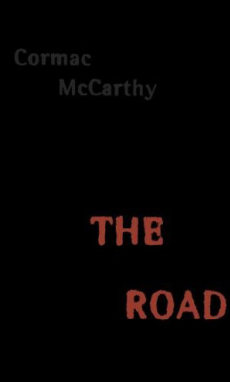
The Road was written by the American novelist, playwright and screenwriter Cormac McCarthy in 2006 and is the story of a father and son journeying through post-apocalyptic America. They are heading for the coast, but the reader is not given a reason as to why they are going there or an idea of what they might find when they get there. It is also never specified as to what has caused this catastrophe; environmental disaster, asteroid strike, nuclear war etc. All we are made aware of is that most of all life has been wiped out. The landscape itself is arid, with no sign of other animals to live off, or even vegetation, with the narrator describing it as “Barren, silent, godless”.
With the rest of the world having been reduced to ash and dust, the father and the son (who are never named; what’s the use of names in a dying world?) have to rely solely upon one another, not just for survival but also so as to retain their humanity. Since there is very little to eat, cannibalism is rife among those who have survived, giving up their respect for human life so that they may live that little bit longer. Worried that one day they may have to resort to extreme measures so as not to starve the boy asks his father, “We wouldn’t ever eat anybody, would we?” The man responds, reassuringly, “No, of course not.”
The dialogue in this novel is incredibly plain and simple, possibly in reflection of the desolateness of their world, yet for this same reason the words exchanged between the two can be heart-wrenching at times. There is poignant moment when the boy asks where they are headed sparking a striking exchange between the father and son (It’s worth noting here that when the characters speak McCarthy chooses not to use quotation marks – or much other punctuation for that matter):
I think we are about two hundred miles from the coast. As the crow flies.
As the crow flies?
Yes. It means going in a straight line.
Are we going to get there soon?
Not real soon. Pretty soon. We’re not going as the crow flies.
Because crows don’t have to follow roads?
Yes.
They can go wherever they want?
Yes.
Do you think there might be crows somewhere?
I don’t know. […]
Could they fly to Mars or someplace?
No they couldn’t.
Because it’s too far?
Yes. […]
After a while the boy said: There’s not any crows. Are there?
No.
In this little exchange we see how even the language which humanity has constructed so as to communicate has become obsolete. McCarthy reminds us how much the meaning and relevance of our language, especially metaphors and colloquialisms, is dependent upon our environment; the phrase “as the crow flies” is shown to be defunct since the crows no longer fly – the phrase, along with the crows are a relic of a bygone era. And this takes us to the heart of the novel, for in envisaging such an arid world and allowing his readers to inhabit it just for a few hours (the book can be read in just a couple of sittings) McCarthy shows humanity, in the words of Alan Warner from the Guardian, “just how much we have to lose.” It is ultimately a modern fable which warns and reminds us not to waste this world away.
Image: "The-road". Licensed under Public Domain via Wikimedia Commons - https://commons.wikimedia.org/wiki/File:The-road.jpg#/media/File:The-road.jpg

0 Comment:
Be the first one to comment on this article.